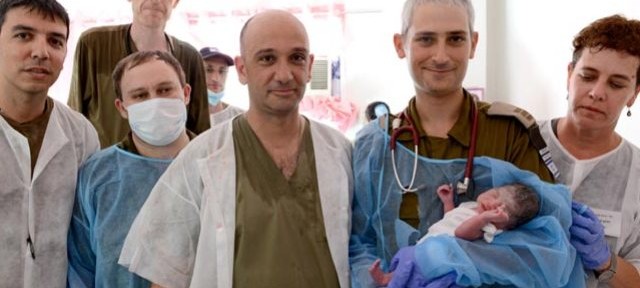FRESH AIR
Israeli field hospital in the Philippines receives high praise
November 19, 2013 | Sharyn Mittelman

One hour after an Israeli field hospital was set up in the Philippines, the first baby was born. Dr. Reuven Keidar congratulated the parents, saying “Mazal tov. It’s a boy.” The parents were so grateful they named him ‘Israel’. Audrin Antigua held her newborn son, and declared: “We choose the name ‘Israel’ as just saying thank you to the Israeli people. Thank you so much.”
To date, 12 babies have been born in the Israeli field hospital set up in the city of Bogo at the northern end of Cebu Island on November 14 to provide medical assistance to the Typhoon ravaged region. Typhoon Haiyan struck on November 8 and is estimated to have killed at least 4,000 people and left 600,000 homeless.
An Israeli scout team was sent to the Philippines in the days after the typhoon struck and decided to establish the field hospital in Bogo because it was a remote area lacking medical facilities, and there did not appear to be any other international medical teams in the region. The Israeli field hospital has reportedly become the central medical facility in this region, serving a population of 250,000 and treating upwards of 300 patients per day. The Israeli team consists of 125 people, including 25 doctors, 15 nurses, and dozens of medics, lab technicians and support staff. It is a multidisciplinary hospital, equipped with an operating room, an X-ray machine and incubators for pre-term babies.
According Col. (res) Dr. Ofer Merin, a heart surgeon who serves as Deputy Director of the Shaare Zedek Medical Center in Jerusalem, Israeli staff are seeing three distinct groups of patients: patient with injuries from the typhoon; patients with illness and disease made worse by the typhoon due to lack of running water and electricity; and patients suffering from diseases that have gone untreated for years.
The Israeli team has also received high praise from observers. John Ging, a top UN humanitarian official, told US’ ABC News: “The field hospital capacity that the Israelis can mobilize is top class, and we have seen it very, very effectively in many other crises as well.”
And Dr. Nancy Snyderman, an NBC correspondent, wrote a piece in which she said she was “in awe” of Israel’s humanitarian work in the Philippines.
“Smart. Sophisticated. Secure. This was what I had experienced with the IDF before. But now I was impressed with something else: the place they had selected. This wasn’t a site where trauma surgeons were needed — those injuries in other towns were being addressed. What the people of Bogo needed was good, solid medical care. They were already living in poverty when the typhoon decimated their fragile infrastructure. I asked the IDF Surgeon General in charge why they chose Bogo. He said it was because they were poor and their needs were great. As I left, I walked away in awe of this group of doctors: physician humanitarians, and medicine at its very best.”
Dr Merin attributed the Israeli team’s effective and quick response in part to the fact that the IDF always sends a scout team which enabled the medical crew to begin working within six to seven hours of arrival; and to the mindset of the medical staff and logistics officers, who serve in the IDF Home Front Command. Dr Merin told the Times of Israel:
“I think it is also a question of the mentality we have. We all know that when there is a disaster – wherever it happens in the world – everyone is ready to drop everything and come and assist wherever we are needed.”
Dr Merin added that the unit trains once a year for precisely such scenarios and has had extensive experience, stretching back to the early 1980s and most recently in Haiti in 2010 and Japan in 2011.
To see a short video on the opening of the Israeli field hospital in the Philippines that includes footage of staff treating patients and baby ‘Israel’ click here. There is also a moving speech by an Israeli IDF official who comments, “There is no place too far, no mission not possible when one decides to help a friend in need.”
Also reportedly assisting the Philippines in the wake of “Haiyan” is the non-governmental Israeli charity IsraAid – which featured in last month’s AIR for their work with Syrian refugees in Jordan. Jewish communities internationally have also mobilised to provide aid to the Philippines. Australians who wish to help can do so by donating via Jewish Aid Australia or the Australian arm of the American Jewish Joint Distribution Committee, as well as via non-Jewish groups such as CARE Australia.
Tags: Asia, Israel, Philippines
RELATED ARTICLES

He survived Bondi. Now he’s fighting back: Arsen Ostrovsky addresses AIPAC conference

US Middle East strategy amid regional instability: Dana Stroul at the Sydney Institute





















